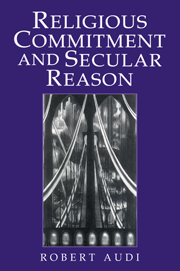Book contents
- Frontmatter
- Contents
- Preface
- PART ONE THE FOUNDATIONS OF DEMOCRACY AND THE SEPARATION OF CHURCH AND STATE
- PART TWO THE ETHICS OF CITIZENSHIP AND THE BALANCE OF RELIGIOUS AND POLITICAL ARGUMENTS
- 4 Religious Convictions and Secular Reasons
- 5 Religion and Ethics: Toward Integration
- PART THREE CIVIC VIRTUE AND POLITICAL ACTIVISM IN A RELIGIOUSLY PLURALISTIC DEMOCRACY
- Conclusion: Ethics, Religion, and Democracy
- Notes
- Index
5 - Religion and Ethics: Toward Integration
Published online by Cambridge University Press: 05 June 2012
- Frontmatter
- Contents
- Preface
- PART ONE THE FOUNDATIONS OF DEMOCRACY AND THE SEPARATION OF CHURCH AND STATE
- PART TWO THE ETHICS OF CITIZENSHIP AND THE BALANCE OF RELIGIOUS AND POLITICAL ARGUMENTS
- 4 Religious Convictions and Secular Reasons
- 5 Religion and Ethics: Toward Integration
- PART THREE CIVIC VIRTUE AND POLITICAL ACTIVISM IN A RELIGIOUSLY PLURALISTIC DEMOCRACY
- Conclusion: Ethics, Religion, and Democracy
- Notes
- Index
Summary
The principles of conscience defended in the last chapter may, in spite of all I have said in interpreting them, still appear to require more of religious citizens than an optimally liberal society should. Although the principles are consistent with both moral and legal rights to act otherwise, they nonetheless express prima facie obligations whose non-fulfillment is a basis for criticism from the point of view of the ethics of citizenship. A sound ethics may at once prohibit coercing people to meet a certain standard and provide for criticism of them if they do not adhere to it. This is how I have represented the principles of secular rationale, secular motivation, and ecclesiastical political neutrality. This chapter will show that these principles can be viewed in a plausible framework of combined theological and ethical standards which, taken together, indicate that the principles do not ask more of religious citizens than a free and democractic society should. Since my concern is largely to show the compatibility between the principles and the religious obligations of conscientious believers and to establish that the principles should be acceptable to a great many believers, it is appropriate to begin by considering sources of religious obligation.
THE DIVERSE SOURCES OF RELIGIOUS OBLIGATION
Religious obligation has at least five kinds of sources and of corresponding evidential grounds. In describing these sources, and indeed in discussing religious obligation in relation to the ethics of citizenship, I am thinking above all of the Hebraic-Christian tradition; but the points that emerge will apply, to varying degrees, to other traditions, including certain non-theistic religious traditions.
- Type
- Chapter
- Information
- Religious Commitment and Secular Reason , pp. 116 - 142Publisher: Cambridge University PressPrint publication year: 2000
- 1
- Cited by

